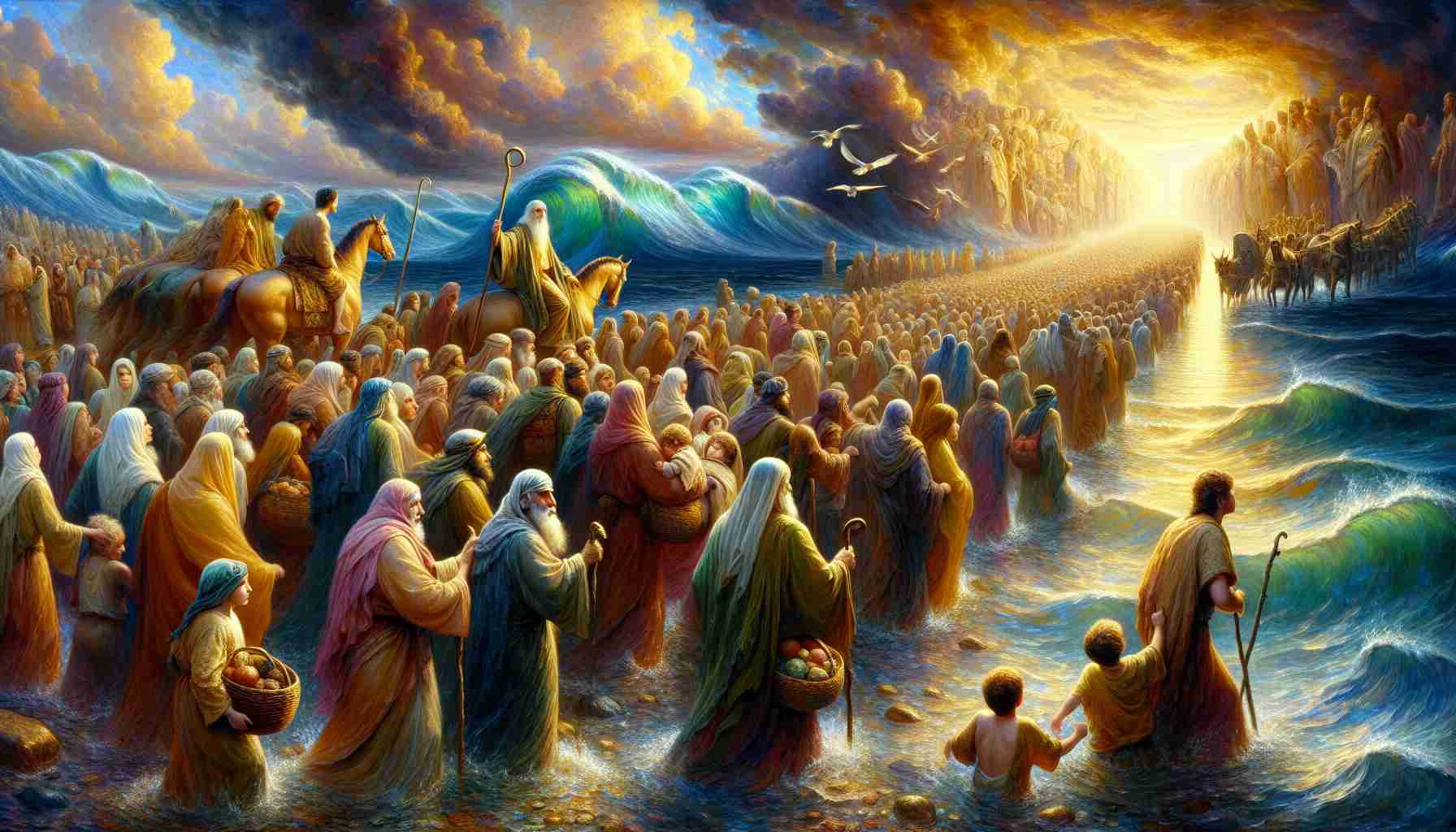

I wasn’t a leader like Moshe—Moses, the one who led us out of Egypt. I wasn’t a prophet or a warrior. I was just the sandal-maker’s son, one of the many who carried baskets and children, climbing after freedom with dusty feet and tired hearts. But I remember the moment everything changed. I remember the wind.
We were trapped. That part I won’t forget. In front of us was the Yam Suf—the Sea of Reeds—and behind us came the pounding of Pharaoh’s chariots. Hundreds of wheels and hooves driving fast, coming to drag us back to slavery.
People shouted all around me.
“You brought us out here to die?”
“There’s no escape!”
I tried to look brave for my little brother. But truthfully, I was shaking. I couldn’t swim. None of us could fight. I squeezed my brother’s hand and whispered Shema—a prayer that reminds us God is One—even though my voice trembled.
Then Moshe raised his staff. At first, nothing happened. But then, the wind came. It wasn’t soft. It howled like a lion, screeching so loud we had to cover our ears. It pushed against the water, and—this is the part no one will ever believe unless they saw it—the sea split.
Walls of water rose on each side, with a path of dry ground in the middle. The elders say that Hashem—the name we use to speak of God with reverence—made the waters stand like a wall. I saw it with my own eyes. I touched the seabed with my own feet.
But no one stepped forward.
We all stood and stared, frozen.
I don’t know why—maybe fear, maybe not trusting it would stay open. Maybe we were still too used to being slaves, waiting for someone to shout, “March!”
Then—it was Nisay, the old date seller. He stepped in first. Not Moshe. Not a soldier. Just wrinkled old Nisay. His feet splashed into the muddy edge—and when nothing happened to him, he kept going. Then others followed, a few at first, then crowds. The dry path became packed with people.
And me? I was still holding my brother’s hand. I knew I had to decide.
I took a deep breath. I remembered the stories my father used to tell—about Avraham, the man later known as Abraham, who followed God without knowing where he was going. About trust.
So I stepped in.
The wind was strong. The smell was salty and strange. I kept waiting for the water to crash down—but it held. Hashem was with us. With every step, something inside me changed. I wasn’t just escaping Egypt. I was walking toward who I was meant to become—free, brave, chosen.
We reached the other side. The moment the last foot crossed, the sea roared back into place, swallowing the Egyptian army. It was over. And we were safe.
Sometimes, a miracle looks like a trap—until you trust God enough to walk through it.
I wasn’t a leader like Moshe—Moses, the one who led us out of Egypt. I wasn’t a prophet or a warrior. I was just the sandal-maker’s son, one of the many who carried baskets and children, climbing after freedom with dusty feet and tired hearts. But I remember the moment everything changed. I remember the wind.
We were trapped. That part I won’t forget. In front of us was the Yam Suf—the Sea of Reeds—and behind us came the pounding of Pharaoh’s chariots. Hundreds of wheels and hooves driving fast, coming to drag us back to slavery.
People shouted all around me.
“You brought us out here to die?”
“There’s no escape!”
I tried to look brave for my little brother. But truthfully, I was shaking. I couldn’t swim. None of us could fight. I squeezed my brother’s hand and whispered Shema—a prayer that reminds us God is One—even though my voice trembled.
Then Moshe raised his staff. At first, nothing happened. But then, the wind came. It wasn’t soft. It howled like a lion, screeching so loud we had to cover our ears. It pushed against the water, and—this is the part no one will ever believe unless they saw it—the sea split.
Walls of water rose on each side, with a path of dry ground in the middle. The elders say that Hashem—the name we use to speak of God with reverence—made the waters stand like a wall. I saw it with my own eyes. I touched the seabed with my own feet.
But no one stepped forward.
We all stood and stared, frozen.
I don’t know why—maybe fear, maybe not trusting it would stay open. Maybe we were still too used to being slaves, waiting for someone to shout, “March!”
Then—it was Nisay, the old date seller. He stepped in first. Not Moshe. Not a soldier. Just wrinkled old Nisay. His feet splashed into the muddy edge—and when nothing happened to him, he kept going. Then others followed, a few at first, then crowds. The dry path became packed with people.
And me? I was still holding my brother’s hand. I knew I had to decide.
I took a deep breath. I remembered the stories my father used to tell—about Avraham, the man later known as Abraham, who followed God without knowing where he was going. About trust.
So I stepped in.
The wind was strong. The smell was salty and strange. I kept waiting for the water to crash down—but it held. Hashem was with us. With every step, something inside me changed. I wasn’t just escaping Egypt. I was walking toward who I was meant to become—free, brave, chosen.
We reached the other side. The moment the last foot crossed, the sea roared back into place, swallowing the Egyptian army. It was over. And we were safe.
Sometimes, a miracle looks like a trap—until you trust God enough to walk through it.